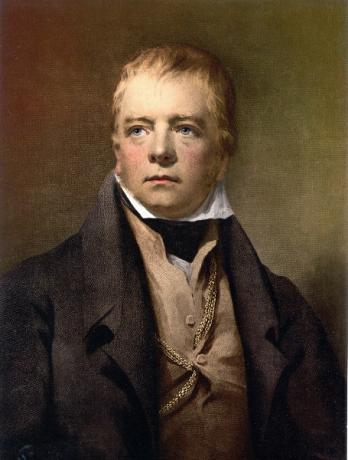Historical novel it's a kind of romance with a historical approach. Thus, he has a fictional narrative with historical facts. The creator of this type of work, in the 19th century, was the Scotsman Walter Scott. In Brazil, José de Alencar was one of the first novelists to write this type of book. Luiz Antonio de Assis Brasil is one of the main authors of the new historical novel.
Read too: Urban novel — type of narrative whose action space is the city
Historical novel summary
It is a fictional narrative that resorts to historical facts in the structuring of its plot.
The main author of historical novels was the Scottish Walter Scott, considered the creator of this type of novel.
War of the Peddlers, in Jose de Alencar, was one of the first Brazilian historical novels.
From the 1970s, in Brazil, the new historical novel had authors such as Luiz Antonio de Assis Brasil.
The new historical novel is mainly characterized by the questioning of official history.
What are the characteristics of the historical novel?
The historical novel is a fictional narrative that presents a historical approach. This means that historical elements are highlighted in the plot. Normally, this type of novel brings a social criticism related to a certain historical period. It can portray the time in which its author lives or a past time.
This type of work reflects on a historical reality interspersed with fictional elements. The historical novel is, therefore, above all a fiction. Thus, fictional characters mingle with “fictionalized” historical characters in the narrative structure.
There is, therefore, a dialogue between fiction and reality and often between the past and the present. Thus, the narrator reveals the reflection of a certain historical period on the characters, who, for the most part, are members of the middle class, that is, the bourgeoisie. After all, this type of novel has a popular and more realistic character.
Do not stop now... There's more after the ad ;)
Historical novel authors
According to the Hungarian philosopher Gyorgy Lukacs (1885-1971), these are the main authors of the historical novel:
Walter Scott (1771-1832) — Scotsman
Alessandro Manzoni (1785-1873) – Italian
James Fenimore Cooper (1789-1851) – American
Prosper Mérimée (1803-1870) — French
Alexander Pushkin (1799-1837) — Russian
Nikolai Gogol (1809-1852) — Russian
Charles Dickens (1812-1870) — English
William Thackeray (1811-1863) — British
Gustave Flaubert (1821-1880) — French
Leo Tolstoy (1828-1910) — Russian
Conrad Ferdinand Meyer (1825-1898) — Swiss
In Brazil, we can cite these authors:
José de Alencar (1829-1877)
José Antônio do Vale Caldre e Fião (1821-1876)
Luís Alves Oliveira Belo (1849-1915)
Erico Verissimo (1905-1975)
Jorge Amado (1912-2001)
Works of the Historical Romance
waverley (1814) by Walter Scott
the spy (1821) by James Fenimore Cooper
The bride and groom (1827), by Alessandro Manzoni
Chronicle of the reign of Charles IX (1829), by Prosper Mérimée
Bulba Taras (1835) by Nikolai Gogol
the captain's daughter (1836) by Alexander Pushkin
the vanity fair (1847) by William Thackeray
the divine shepherdess (1847), by José Antônio do Vale Caldre e Fião
the privateer (1851), by José Antônio do Vale Caldre e Fião
A tale of two cities (1859) by Charles Dickens
salammbo (1862) by Gustave Flaubert
the silver mines (1862), by José de Alencar
War and peace (1865) by Leo Tolstoy
the amulet (1873) by Conrad Ferdinand Meyer
War of the Peddlers (1873), by José de Alencar
Alphabets (1873), by José de Alencar
the rags (1877), by Luís Alves Oliveira Belo
endless lands (1943), by Jorge Amado
The time and the wind (1949-1961), by Erico Verissimo
Read too: Anguish: novel by Graciliano Ramos
Creation of characters in the historical novel
In the historical novel, Walter Scott highlighted the common, average citizen and his conflicts, consistent with the time in which he lives. In this way, the characters in the historical novel are structured with characteristics that make them part of the historical period in which they are inserted.
In addition, the characters in this type of novel can also be real characters in the history of a particular country. Each author, thus, can use fictional and historical characters in his plot. For example, in salammbo, book of Flaubert, the statesman Amílcar Barca, father of Salammbô, is a character who actually existed.
Creation of the historical novel
According to Lukács, the main scholar of the historical novel, this literary subgenre has its origins in the 19th century, with the novels of Walter Scott.
Historical context of the historical novel

At the beginning of the 18th century, the Englishmen decided to strengthen political ties with Scotland. Thus, in 1707, during the reign of Queen Anne (1665-1714), the Act of Union allowed the creation of a new Parliament, in London, with the presence of English and Scots. The Kingdom of Great Britain was created.
However, Scotland remained Presbyterian, with its own currency and an independent judicial system. The union with England still displeased part of the Scottish people, who fought to maintain the country's political independence. Despite this, Scotland's economy initially strengthened after the treaty with England.
Decades later, during the reign of George III (1738-1820), Britain found itself involved in United States War of Independence, which lasted from 1775 to 1783. Later, with the Act of Union of 1800, Ireland joined Great Britain, and thus the United Kingdom, which soon began a war against Napoleon Bonaparte (1769-1821). In this context, Walter Scott, the inventor of the historical novel, was born.
Thus, the emergence of this type of novel, according to Unicamp professor Carlos Eduardo Ornelas Berriel, was due to the “creation of the first mass armies”:
With the creation of the first mass armies, with the political action of Napoleon, who convulsed and renewed the living conditions of entire peoples, history irresistibly bursts into life. of individuals, giving rise to the concrete conditions for men to conceive their existence as something historically founded and to see in history a profound influence on their daily.|1|
In Brazil, the historical novel emerged during the romanticism. Thus, it was part of the romantic project, which intended to strengthen the feeling of nationality in Brazilians after the independence from Brazil, in 1822. Such a novel, therefore, shows facts of national history from a heroic perspective.
The biggest name in this type of novel, in the 19th century, was José de Alencar. In his works, the historical context was used not only in exclusively historical novels, but also Alphabets, but also in Indian works, such as iracema, and even regionalists, such as the gaucho.
In contemporaneity, the production of historical novels no longer bears the boastful romantic character. Now, historical facts enter the novel to be questioned or mocked. This is the case of romance Galvez, Emperor of Acre, in which the narrator by Márcio Souza shows an unheroic Galvez.
Check it out on our podcast:The figure of the trickster in Brazilian literature
Postmodern historical novel
According to Carlos Alexandre Baumgarten,|2| doctor in Literary Theory, the precursor of the so-called new historical novel wasthe kingdom of this world (1949), by the Cuban writer Alejo Carpentier (1904-1980). As for Brazil, it was from the 1970s onwards that the new historical novel took on the following characteristics:
questioning the official history;
distortion of historical elements;
protagonism of historical characters;
metalanguage;
intertextuality;
irony.
Works from this period are:
by iron and fire (1972-1975), by Josué Guimarães
Galvez, Emperor of Acre (1977), by Marcio Souza
the raven's offspring (1978), by Luiz Antonio de Assis Brazil
mad mary (1980), by Marcio Souza
In freedom (1981), by Silviano Santiago
The strange nation of Rafael Mendes (1983), by Moacyr Scliar
The men marked (1985), by Tabajara Ruas
the city of priests (1986), by Deonisio da Silva
province dogs (1987), by Luiz Antonio de Assis Brasil
August (1990), by Rubem Fonseca
mouth of hell (1990), by Ana Miranda
crystal vines (1990), by Luiz Antonio de Assis Brasil
the portrait of the king (1991), by Ana Miranda
The majesty of the Xingu (1997), by Moacyr Scliar
the republic of bugs (1999), by Ruy Tapioca
the outcast (2004), by Ruy Tapioca
the wooden machine (2012), by Miguel Sanches Neto
In addition to foreign works, such as:
The harp and the shadow (1978), by the Cuban Alejo Carpentier
the dogs of paradise (1983), by Argentine Abel Posse
Pomegranate (2007), by the American Steven Saylor
the seventh door (2008), by the American Richard Zimler
fall of giants (2010), by the British Ken Follett
The Istanbul Prophecy (2010), by the Portuguese Alberto Santos
The Cursed Book Merchant (2011), by Italian Marcello Simoni
the Ginga queen (2014), by the Angolan José Eduardo Agualusa
Grades
|1|BERRIEL, Carlos Eduardo Ornelas. “On the Historical Novel”. In: LUKÁCS, György. the historical novel. Translation by Rubens Enderle. Sao Paulo: Boitempo, 2011.
|2| BAUMGARTEN, Carlos Alexandre. The new Brazilian historical novel: the gaucho case. Today's lyrics, Porto Alegre, v. 37, no. 2, p. 75-82, Jun. 2001.
By Warley Souza
Literature teacher



